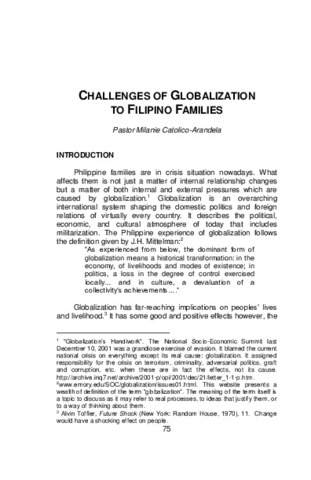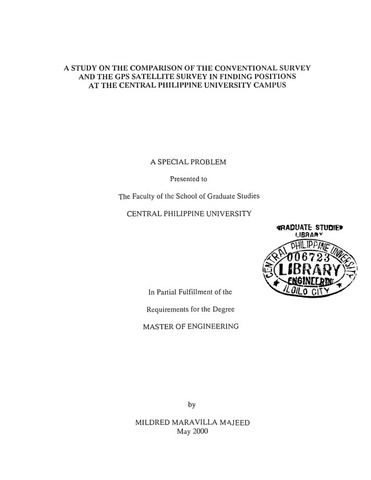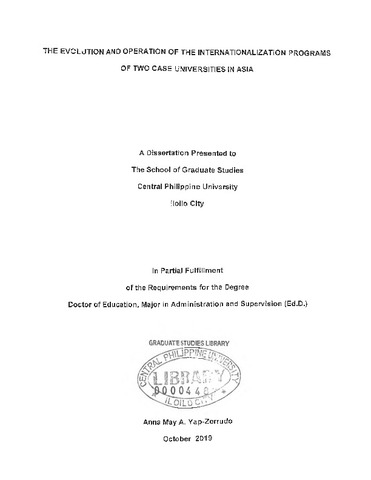Challenges of globalization to Filipino families
Abstract
Philippine families are in crisis situation nowadays. What affects them is not just a matter of internal relationship changes but a matter of both internal and external pressures which are caused by globalization. Globalization is an overarching international system shaping the domestic politics and foreign relations of virtually every country. It describes the political, economic, and cultural atmosphere of today that includes militarization. The Philippine experience of globalization follows the definition given by J.H. Mittelman:
“As experienced from below, the dominant form of globalization means a historical transformation: in the economy, of livelihoods and modes of existence; in politics, a loss in the degree of control exercised locally… and in culture, a devaluation of a collectivity’s achievements….”
Globalization has far-reaching implications on peoples’ lives and livelihood. It has some good and positive effects, however, the negative outweighs them. In the Philippines, globalization worsens the already poor situation of the masses. It sends millions of Filipinos to work on a global stage where there is shortage of laborers, skilled, domestic and professional workers. This is because of unemployment and underemployment brought about by structural adjustments in the country. Globalization has converted rice lands, water and ancestral domain of indigenous peoples to multi-national companies for export products, high-tech fishing and mining operations, respectively. Farmers and fisher folks go empty-handed, hungry and mostly indebted while indigenous peoples wander to exist. The import liberalization policy has destroyed the domestic economy as it continues the closure of small and medium enterprises. It causes Filipinos to consume cheaper import products and their own products left unsold or sold at a much cheaper price. Globalization allows privatization of social institutions (e.g. schools, hospitals and other social centers) and services (e. g. water and light), that are much needed by the poor majority. Globalization allows foreign militarization into the country to fight the so-called global terrorism. This threatens people, destroys nature and life rather than build peace and justice. The effects of globalization are felt worldwide and, sad to say, the Philippines is on the losing side.
Description
Journal article
Suggested Citation
Arandela, M. C. (2007). Challenges of globalization to Filipino families.Type
ArticleSubject(s)
Keywords
Collections
- Journal articles [28]
- Journal of Theology [24]
Related items
Showing items related by title, author, creator and subject.
-
Study on the comparison of the conventional survey and the GPS satellite survey in finding positions at the Central Philippine University campus
Majeed, Mildred Maravilla (2000)This study was conducted to make a comparison of the conventional survey using the theodolite and measuring tape with that using the present state-of-the art equipment, the Global Positioning System (GPS) navigator/receiver. ... -
Tryk: A mobile transportation application using Bellman Ford algorithm
Fuentes, Anntoniete A. (2020)Tryk is a mobile transportation application for a transport service provider that facilitates communication between the commuters and tricycle drivers regarding transportation services with the localities. Tryk is linked ... -
The evolution and operation of the internationalization programs of two case universities in Asia
Yap-Zerrudo, Anna May (2019)This qualitative case study aimed to examine and understand the evolution and operation of internationalization programs of two case universities in Asia. Using the multiple case study design with multiple units of analysis, ...





